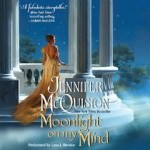Narrated by Lana J. Weston
Summer Is for Lovers is an enjoyable, if predictable, story set at the seaside resort of Brighton in the mid-nineteenth century. Brighton is a nice change of scene for a British-set historical, as the majority of those are set in and around London. Even more unusual is the fact that the heroine, rather than being a wallflower, poor-relation, drab governess, or feisty debutante, is a young woman of athletic bent.
The book opens with twelve-year-old Caroline Tolbertson saving a young soldier from drowning in the sea off the Brighton coast. She’s younger and smaller but her skill in the water is prodigious and she is able to rescue him from the dangerous current. Even though he’s dripping wet and worse the wear for drink, he’s handsome, charming, witty, and rather sweetly self-deprecating about being rescued by a girl! And, of course, young Caroline tumbles head-over-heels for him.
Many years later, the two stumble across each other by the Brighton sea-front again. Now in his early thirties and resigned from the army, David Cameron (and how I wish the author had given her hero a different surname, because it was really distracting!) has travelled to the resort with his mother, who is very ill, in the hopes that a change of air will be beneficial to her health. The intervening years have not seen much change for Caroline, however, who is still unmarried at the advanced age of twenty-three, and residing in the town with her mother and sister.
One of the things that sets Summer Is for Lovers apart from most other historical romances is the fact that Caroline is a hugely talented swimmer. I don’t think I’ve come across a story in which the heroine is an athlete before, because, of course, at the time in which the book is set, for a young woman to be sporty in that way was frowned upon. In fact, it was frowned upon for a woman to be good at anything to a very high standard, whether it be music, art, or sport. Females were expected to have a long list of “accomplishments” but woe betide any woman who excelled in any field, because she could not be a “professional” anything. (Unless she earned her living on her back, but that’s not this story!)
She may be incredibly talented in the water, but on land, Caroline is a mass of insecurities. She knows that her physique is not at all in the currently accepted mode for beauty. She’s tall, lithe, long-legged, and small-breasted at a time when petite and curvaceous was the preferred body type. She dresses abominably and her hair – usually simply and ruthlessly tied back for swimming – is uncared for and messy. It doesn’t help matters that, shortly before she meets David again, she had foolishly allowed a young man to kiss her, who then proceeded to tell all his friends that kissing her had been like kissing a boy. Thus Caroline, already sensitive about her height, broad shoulders, and lack of curves, is made to feel even less feminine and more undesirable than she had already believed herself to be. The problem is that her family’s financial situation means that it’s time for her to find herself a husband and gossip about her lack of feminine charms is certainly not going to help Caroline to secure an offer.
When David hears the gossip and discovers how much it has upset Caroline, he determines, as her friend, to help her. He enjoys her company and has quickly discovered that she is not a vapid London miss with no conversation or opinions of her own, so even though he is not interested in her himself (preferring the smaller, curvy type of woman), he goes about setting some of the young bucks straight as to the nature of Caroline’s attractions.
But David’s comments succeed too well and it’s not long before Caroline finds herself besieged by admirers. And as if that isn’t bad enough, the more time David spends with her, the more he finds himself looking at her in a new light and deciding that none of the men dangling after her are good enough.
I liked that Caroline’s transformation from Ugly Duckling to Beautiful Swan was not effected by means other than having a few decent dresses made that showed her body to its long, lithe advantage instead of trying to squash her into the current fashions which looked terrible on her. But the most important factor was the confidence David gave her to be herself, and see herself as an attractive woman.
This is a story in which the hero and heroine forge a strong friendship and develop a deep emotional bond before they become lovers, which is something I always enjoy in a romance. There is some delicious sexual tension between David and Caroline as well as a sense of sincere affection and companionship.
For the most part, the quality of the writing, the characterisation, and the performance was good enough for me to be able to overlook the major flaw with the story. I know I can be very picky about plotlines, but there are some stories in which, although I can see or hear weaknesses, there are other things which are so good that they cancel them out. That’s almost the case here, but I couldn’t quite ignore the flimsiness of the premise which provides the obstacles in the way of David and Caroline’s HEA. For most of the book, David is desperately attracted to Caroline and, on a couple of occasions, comes very close to doing a lot more than look. But he always pulls back from her due to the fact that he is carrying a shed-load of guilt over the death of his first love eleven years before, which has brought him to the conclusion that he is not fit to be involved in any way with a good and innocent young woman like Caroline.
I’m afraid that that sort of reasoning invariably makes me want to throw the book at the wall, or rip out my earphones. I can certainly understand a recently bereaved character being reluctant to become involved with someone else, but it’s been eleven years since the young woman’s death, and that’s a ridiculously long time to self-flagellate.
I also felt a little uncomfortable at the way in which David keeps rebuffing Caroline by pretending not to notice that her feelings for him go way beyond friendship. At one point, she all but tells him she loves him and he makes light of it by appearing to believe she’s talking about someone else. At that point, I really did want him to smack him and tell him to man up and leave her alone rather than seeking her out at every opportunity if he really didn’t want her.
I thought that the descriptions of the town and the beaches gave an excellent sense of place, and that the cast of supporting characters, from Caroline’s sister Penelope (to whom there was much more than at first seemed) and the local reigning beauty, Miss Baxter, to the young tulips of the ton, Mr. Dermott and Mr. Hamilton was very well drawn.
Lana J. Weston is another new-to-me narrator and for the most part, she acquitted herself well. She was very good at bringing out the humour and is one of those narrators who makes good use of silence. I did find the pace of her reading a little slow at times although it didn’t spoil the overall experience. Each character is clearly defined and the Scottish accent she used for David was accurate and consistent. But because Ms. Weston doesn’t lower the pitch of her voice substantially to perform the male characters, I found it difficult to match the picture the author was painting of David as a tall, broad-shouldered blond Adonis with the softly accented voice flowing into my ears. Ms. Weston relied more on accent to differentiate him from the other men and, more importantly, from Caroline, and because both their voices were performed in the same register, he sounded somewhat less than masculine.
She was more successful in the secondary male roles, such as Mr. Dermott and his friends, where she employed a sneering, nasal tone that perfectly suited the supercilious young men of the ton.
While this was, in general, a good performance by someone who seems to be new to the world of audiobooks, I feel compelled to mention the fact that there were a few glaring errors in pronunciation dotted throughout the story. For example, Ton is not pronounced “tone” and Marquess is not pronounced “Marcus”. It may not be an issue for someone who doesn’t listen to many historicals, but these are words which will be found in almost every historical romance set in the 19th century so, for someone like me, who listens to a LOT of them, a mispronunciation like that is going to take me out of the story each time it happens. There were also occasions where ordinary, every-day words were mispronounced; for example, “sluiced” should be pronounced “sloossed” and not “sloo-issed”.
So once again, I’m on my soapbox about the need for “audio proofreading” or some equivalent procedure that takes place during the recording process. Many narrators read books across a wide range of genres, and I’m sure that most of those have genre-specific vocabulary with which the reader might not be immediately familiar. But to fans of those genres, errors will be glaring and surely, it’s important to minimize them as far as possible.
Those reservations apart, Summer is for Lovers is a refreshingly lighthearted story about friendship, love, and forgiveness. The writing is infused with wit and humour, the characterisation is excellent, and Lana J. Weston has real potential as a narrator in the genre.
Editor’s Note: The grade for content was mistakenly published as a C+. The content grade is, in fact, a B. Our apologies to Ms. McQuiston and Harper Audio. The grade has been changed.
Caz
Narration: C+
Book Content: B
Steam Factor: Glad I had my ear buds in
Violence: None
Genre: Historical Romance
Publisher: Harper Audio
Summer Is for Lovers was provided to AudioGals for review by Harper Audio.





3 thoughts on “Summer Is for Lovers by Jennifer McQuiston”
Comments are closed.